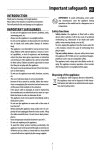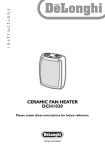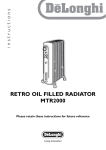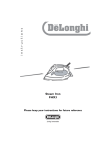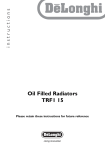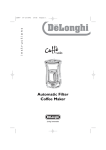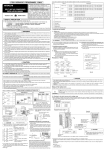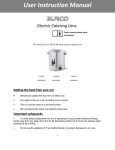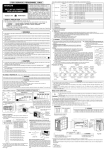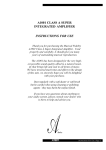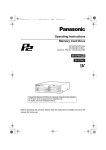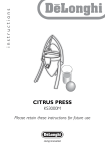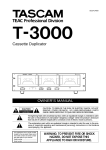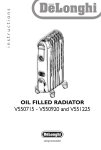Download De'Longhi HR720B User's Manual
Transcript
instructions ELECTRIC HEATING CONVECTOR HR720B Please retain these instructions for future reference Pilot light Display Thermostat knob Switch A Fig.2 Fig.1 2 HR Thank you for choosing this De’Longhi convector. To get the very best out of your new convector it is advisable to read these instructions before using it. This will ensure that you gain optimum results and use the convector safely. Assembling the feet Fit the feet to the convector as follows: - Insert the foot ensuring that the bigger hole A on the foot coincides with the screw mounted on the base of the convector (see figure 1); then screw in the remaining three screws (see figure 2) which are supplied. Note: the convector must be used only with the feet correctly fitted! Electrical connection - Before plugging the convector into the mains, check that your supply voltage is the same as that shown on the rating plate of the convector and that the electric installation is suitable to the power shown on the rating plate. - If using more than one convector at a time, it is important to ensure that the ring main is adequate to cope with the power requirements. - This convector complies with EEC Directive 89/336 relating to electromagnetic compatibility. Operation and use Turning the convector on Insert the plug into the mains socket and switch on turning the thermostat knob clockwise until it can be turned no further; then position the switch up in the I position (minimum power, 1 kw) or down in the II position (maximum power, 2 kw): the red pilot light will come on. We suggest that on days when temperatures are not particularly cold, select minimum output to optimise savings on energy consumption. Turning the convector off To switch the convector off, position the switch in the middle, in the “0” position. Adjusting the thermostat When the room has reached the desired temperature, turn the thermostat knob slowly in an anti-clockwise direction until you hear a click and the convector turns off (pilot light off). The thermostat will now keep the temperature in the room constant, turning the convector on and off as appropriate. HR 3 Cleaning and maintenance The convector should not require any maintenance. However before carrying out any cleaning or maintenance, unplug the convector from the mains and wait for it to cool (this should take around 5 minutes). It is sufficient to remove external dust with a soft, dry cloth. Never use abrasive powders or solvents. If necessary, remove concentrated areas of dirt with a vacuum cleaner. Warnings - Do not use the convector in a bathroom or in the vicinity of bathtubs, wash basins, showers or swimming pools. - Never use the convector to dry laundry. - Never place the power cable on top of the convector while it is hot. - Only use the convector in an upright position. - Do not block the outlet grilles at the top of the convector or the intake grille at the bottom of the convector . - The convector must be positioned at least 50cm from furniture or other objects. - If the power cable is damaged, it must be replaced by the manufacturer, an authorised service centre or a qualified electrician in order to eliminate all risk. - Do not use this convector in rooms which have a floor area smaller than 4m2. - We recommend that you do not place the convector in a draught as this may adversely affect the convector ’s operational efficiency. - The convector must never be placed immediately under a fixed mains socket. - A safety device intervenes and turns the convector off in the event of overheating or because the convector is positioned in a strong draught of air. To reactivate the convector , remove the plug from the mains, allow the convector to cool (for about 5 mins), remove the cause of the overheating/draught and then plug the convector back into the mains and turn it back on. - The use of an extension lead is not recommended, as overheating of the extension lead may occur during the operation of the convector - In order to avoid any danger caused by an accidental resetting of the safety system, this convector must not be powered through an external timer. - As with any electrical convector , whilst the instructions aim to cover as many eventualities as possible, caution and common sense should be applied when operating your convector , particularly in the vicinity of young children. Important: never cover this convector in any manner whatsoever while it is operating as this could lead to dangerous overheating. HR 4 Electrical requirements Warning - this appliance Before using this appliance ensure that the voltage indicated must be earthed on the product corresponds with the main voltage in your Green and Yellow to Earth home, if you are in any doubt about your supply contact your local electricity company. 13 amp The flexible mains lead is supplied connected to a B.S. 1363 fused plug Fuse having a fuse of 13 amp capacity. Should this plug not fit the socket outBrown lets in your home, it should be cut off and replaced with a suitable plug, to Live following the procedure outlined below. Note: Such a plug cannot be used for any other appliance and should Blue to Cord Clamp Neutral therefore be properly disposed of and not left where children might find it and plug it into a supply socket - with the obvious consequent danger. N.B. We recommend the use of good quality plugs and wall sockets that can be switched off when the machine is not in use. important: the wires in the mains lead fitted to this appliance are coloured in accordance with the following code: GREEN ANDYELLOW EARTH BLUE NEUTRAL BROWN LIVE As the colours of the wires in the mains lead of this appliance may not correspond with the coloured markings identifying the terminals in your plug, proceed as follows: The wire which is coloured green and yellow must be connected to the terminal in the plug which is marked with the letter E or by the earth symbol or coloured green or green and yellow. The wire which is coloured blue must be connected to the terminal which is marked with the letter N or coloured black. The wire which is coloured brown must be connected to the terminal which is marked with the letter L or coloured red. When wiring the plug, ensure that all strands of wire are securely retained in each terminal. Do not forget to tighten the mains lead clamp on the plug. If your electricity supply point has only two pin socket outlets, or if you are in doubt, consult a qualified electrician. Should the mains lead ever require replacement, it is essential that this operation be carried out by a qualified electrician and should only be replaced with a flexible cord of the same size. After replacement of a fuse in the plug, the fuse cover must be refitted. If the fuse cover is lost, the plug must not be used until a replacement cover is obtained. The colour of the correct replacement fuse cover is that of the coloured insert in the base of the fuse recess or elsewhere on the plug. Always state this colour when ordering a replacement fuse cover. Only 13amp replacement fuses which are asta approved to B.S. 1362 should be fitted. This appliance conforms to the Norms EN 55014 regarding the suppression of radio interference. HR 5 319IDL/09.04






